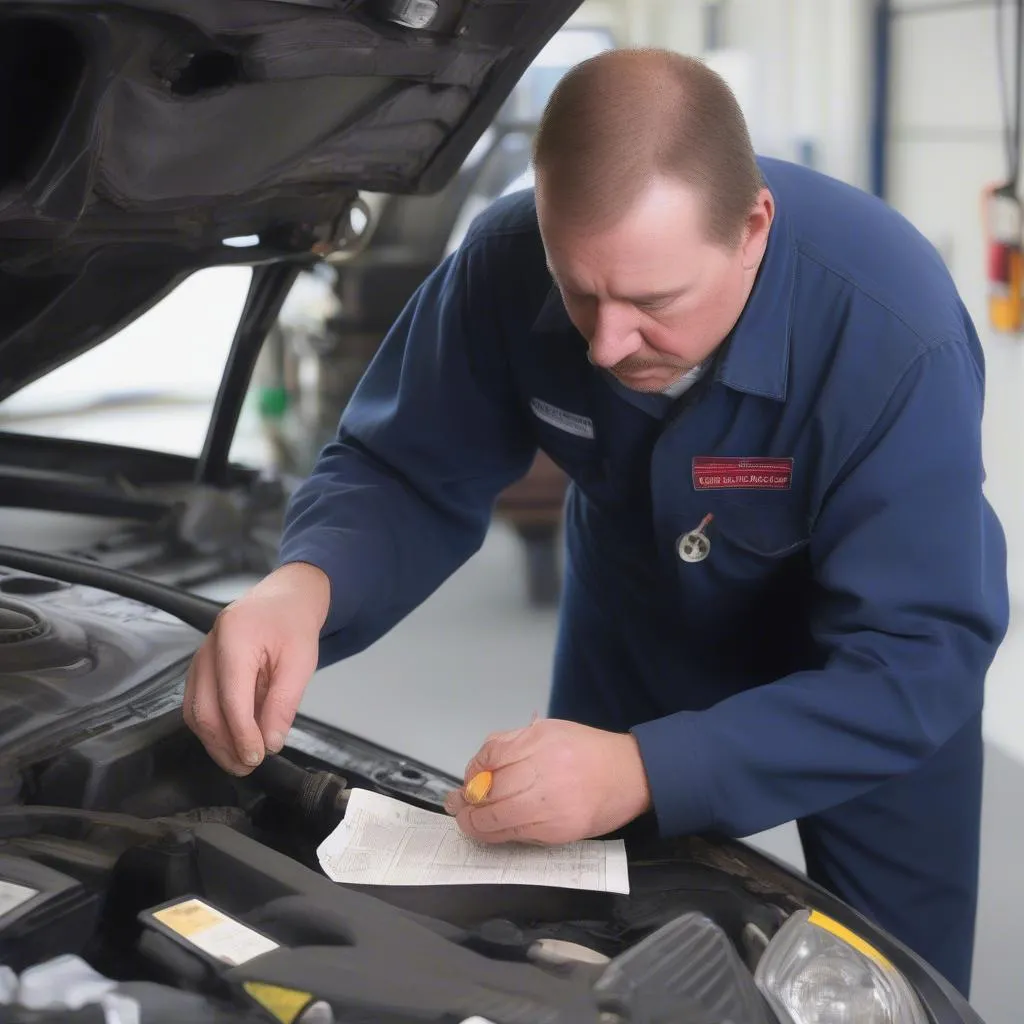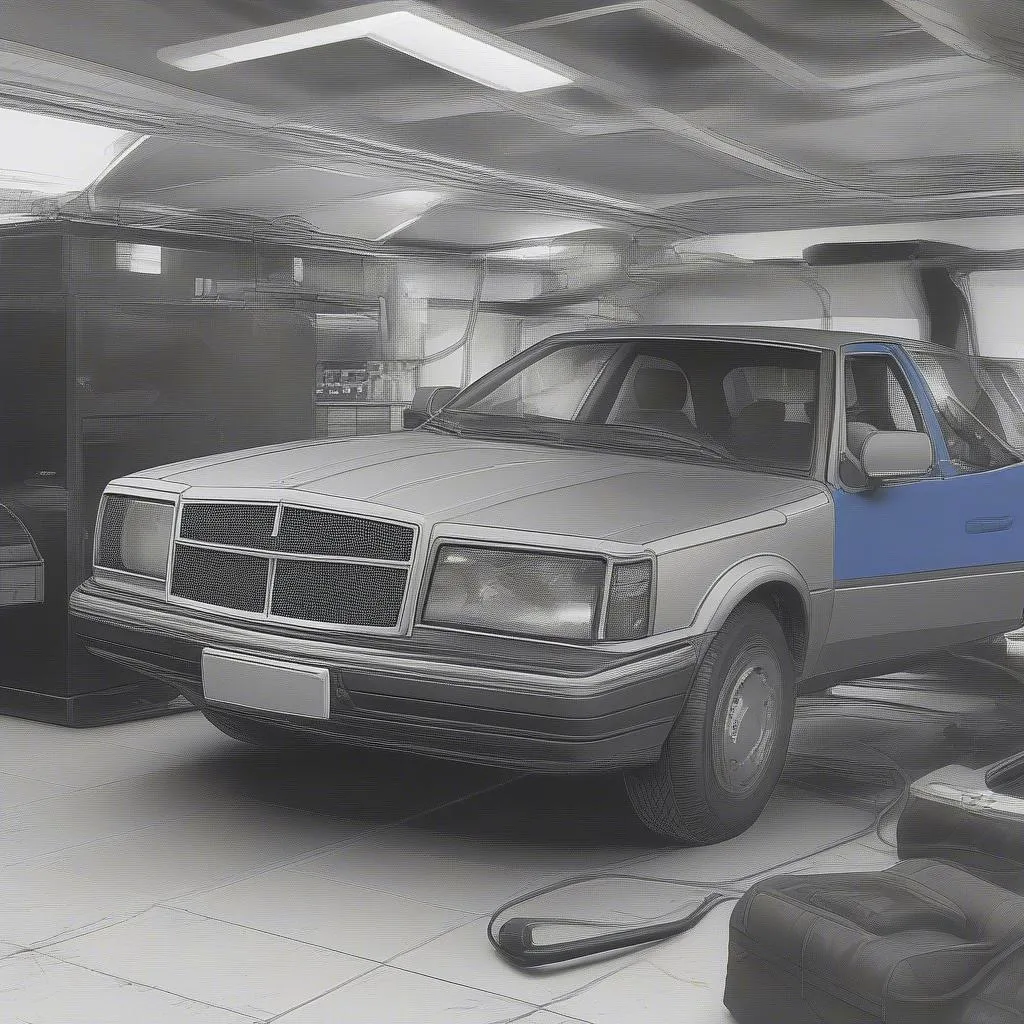Have you ever been in a car accident? Maybe you’ve been fortunate enough to escape without any injuries, but the thought of your airbags deploying is probably something that crosses your mind. Airbags are a crucial safety feature in modern cars, designed to protect you and your passengers in the event of a collision. But what happens when your airbag system malfunctions? What exactly does “airbag repair” involve, and how can you ensure your safety in the event of a future accident?
Understanding Airbag Repair: A Crucial Safety Measure
Airbag repair is a complex and vital process that addresses any issues within your vehicle’s airbag system. Whether it’s a faulty sensor, a damaged control module, or a deployed airbag that needs replacement, proper repair ensures the system functions correctly. This is more than just a convenience; it’s a safety measure that could potentially save your life or the lives of your loved ones.
Airbag Repair: What Does It Entail?
Diagnosing the Problem: The First Step Towards Repair
The first step in airbag repair is diagnosing the problem. This often involves using a specialized diagnostic tool, such as a dealer scanner for European cars, which is designed to communicate with the airbag control module and retrieve fault codes.
Think about it like this: Imagine your car’s airbag system as a sophisticated puzzle with various interconnected parts. A diagnostic tool acts like a detective, looking for clues to solve the puzzle and pinpoint the source of the problem.
Common Airbag Issues and Their Solutions
1. Malfunctioning Airbag Sensors: Airbag sensors are responsible for detecting impacts and triggering the deployment of airbags. They can be damaged by accidents, corrosion, or simply wear and tear.
2. Damaged Airbag Control Module: The airbag control module is the “brain” of the system, interpreting information from the sensors and controlling the deployment of airbags. This module can also be damaged in an accident or due to electrical issues.
3. Deployed Airbags: Deployed airbags are meant to be replaced after they are activated, as they are designed for single-use only.
4. Wiring and Connector Problems: Damaged wiring or connectors within the airbag system can disrupt electrical signals and prevent airbags from deploying correctly.
Addressing Airbag Repair: Finding the Right Expertise
Here’s the thing: Airbag repair isn’t something you should attempt yourself. It requires specialized knowledge, proper tools, and a deep understanding of automotive safety regulations.
Think of it this way: You wouldn’t attempt to perform surgery on yourself, right? Similarly, you shouldn’t tinker with your car’s airbag system without professional assistance.
What To Look For in a Reliable Airbag Repair Service
1. Expertise: Look for a repair shop with technicians who are specifically trained in airbag repair and are certified by recognized automotive associations.
2. Proper Equipment: The shop should have the right tools and diagnostic equipment, including dealer scanners for European cars, to ensure they can properly diagnose and repair any issues.
3. Safety First: A reputable repair shop will prioritize safety and ensure that all procedures are carried out in accordance with manufacturer specifications and safety standards.
The Importance of Regular Maintenance for Your Airbag System
Just like any other vital system in your car, your airbag system requires regular maintenance to ensure it operates optimally. This involves:
-
Visual Inspections: Regularly check the airbag warning light on your dashboard. A blinking or illuminated light signifies a problem that needs attention.
-
Periodic Inspections: Schedule periodic inspections of your airbag system by a qualified mechanic.
Airbag Repair: A Safety Investment
Airbag repair may seem like an added expense, but it’s an investment in your safety and that of your loved ones. A properly functioning airbag system can significantly reduce the risk of serious injuries in the event of a collision.
Frequently Asked Questions (FAQ) About Airbag Repair
What is the cost of airbag repair?
Cost of repair varies depending on several factors, including:
-
Type of vehicle: Different car models have different airbag systems, with varying costs for parts and labor.
-
Problem severity: A simple sensor replacement will cost less than a complete airbag module replacement.
-
Labor charges: Labor costs can vary depending on the location and expertise of the repair shop.
For a general idea: An airbag sensor replacement could cost between $100 and $500, while a control module replacement might range from $500 to $1,500. Keep in mind: These are just estimates, and it’s always best to contact a repair shop for a specific quote.
Can I reset my airbag light myself?
Resetting an airbag light without proper diagnosis and repair can be dangerous. It’s crucial to understand that an airbag light doesn’t simply indicate a minor issue. It could signify a serious problem within the airbag system.
For instance: A faulty sensor could be a sign of a more severe underlying problem that’s not yet apparent. Ignoring the warning light could potentially put you and your passengers at risk.
Instead of attempting to reset the light yourself, contact a qualified technician to diagnose and resolve the underlying issue.
What happens if I don’t repair my airbag system?
Driving with a faulty airbag system is extremely dangerous and poses a significant safety risk. In the event of a collision, the airbags might not deploy as intended, potentially leading to severe injuries.
Here’s a chilling thought: Imagine being involved in a car accident and your airbags not deploying. The consequences could be devastating.
Furthermore: Driving with a faulty airbag system could also lead to legal complications in the event of an accident.
It’s essential to prioritize your safety and that of others by getting your airbag system repaired as soon as possible.
How do I know if I need airbag repair?
The most obvious indication is the airbag warning light on your dashboard. A blinking or illuminated airbag light is a clear signal that your system needs attention.
Other signs that might indicate a problem with your airbag system include:
-
A clicking or popping sound: This might indicate a faulty sensor or wiring issue.
-
An airbag control module failure: Your car’s electrical system may exhibit other problems if the airbag control module is faulty.
If you notice any of these signs, don’t hesitate to contact a qualified technician for a diagnosis and repair.
Can I replace my own airbags?
Absolutely not. Airbag replacement is a highly specialized procedure that requires specific training, tools, and expertise. Replacing your own airbags can be extremely dangerous and could result in serious injuries.
Here’s why you shouldn’t do it:
-
Safety risks: Airbags contain explosive materials and require proper handling procedures to avoid accidental deployment.
-
Potential for damage: Improper installation of airbags can lead to malfunctions, further damaging the system.
-
Legal ramifications: Replacing your own airbags could invalidate your vehicle’s warranty and potentially create legal complications.
Always leave airbag replacement to a qualified technician.
What if my car was in an accident, but the airbags didn’t deploy?
If you’ve been involved in a car accident where the airbags didn’t deploy, it’s essential to have your vehicle inspected by a qualified technician. There might be an issue with the airbag system that needs to be addressed.
Think about this: There could be a problem with the sensors, the control module, or even a wiring issue that prevented the airbags from deploying.
Don’t take any chances. Get your airbag system inspected and repaired to ensure it’s safe and ready for future accidents.
Do I need to replace my airbags after an accident?
In most cases, yes. Airbags are designed for single-use only. Once deployed, they are considered damaged and should be replaced.
Here’s why: A deployed airbag might not be able to inflate properly in a subsequent collision.
If you’ve been in an accident where your airbags deployed, contact a qualified repair shop to have them replaced.
What are the benefits of having my airbags repaired?
The benefits of having your airbags repaired are undeniable. A properly functioning airbag system:
-
Reduces the risk of serious injuries: Airbags are designed to protect occupants in the event of a collision, minimizing the impact of the accident.
-
Improves overall vehicle safety: A safe and reliable airbag system contributes to the overall safety of your vehicle.
-
Ensures compliance with safety regulations: Repairing your airbag system ensures that it meets all applicable safety standards.
-
Protects your investment: A properly functioning airbag system helps maintain the value of your vehicle.
Airbag Repair: A Safety Priority
Airbag repair is a vital safety measure that should not be overlooked. If you have any doubts about your vehicle’s airbag system, don’t hesitate to contact a qualified technician.
Remember: Your safety and that of your loved ones is paramount. Don’t take chances with your airbag system.
Need Help With Airbag Repair?
We offer a variety of diagnostic tools, including dealer scanners for European cars, that can assist with airbag repair and diagnosis.
We have experienced technicians ready to help with any airbag system issues.
Contact us today for a free consultation.
Whatsapp: +84767531508
Ready to Learn More?
Explore our website for more information on:
-
Autel SRS Reset Tools: https://diagxcar.com/autel-srs-reset-tool/
-
Autel SRS Products: https://diagxcar.com/autel-srs-products/
-
Autel Airbag Reset Tool: https://diagxcar.com/autel-airbag-reset-tool/
-
How to Reset Airbag Module After Accident: https://diagxcar.com/how-to-reset-airbag-module-after-accident/
-
Hyundai G-Scan Tool: https://diagxcar.com/hyundai-g-scan-tool/
Let us know your thoughts in the comments below!
 Airbag Repair: Ensuring Safety and Functionality
Airbag Repair: Ensuring Safety and Functionality
 Airbag Diagnostic Tool
Airbag Diagnostic Tool